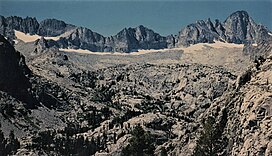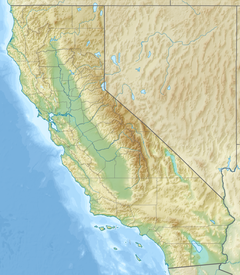| Mount Jepson | |
|---|---|
 Northeast aspect, centered at top Northeast aspect, centered at top | |
| Highest point | |
| Elevation | 13,390 ft (4,081 m) |
| Prominence | 334 ft (102 m) |
| Parent peak | Mount Sill (14,159 ft) |
| Isolation | 0.60 mi (0.97 km) |
| Coordinates | 37°05′20″N 118°29′43″W / 37.0888496°N 118.4952691°W / 37.0888496; -118.4952691 |
| Naming | |
| Etymology | Willis Linn Jepson |
| Geography | |
  | |
| Location | Kings Canyon National Park Fresno / Inyo Counties California, U.S. |
| Parent range | Sierra Nevada |
| Topo map | USGS Split Mountain |
| Geology | |
| Rock age | Cretaceous |
| Mountain type | Fault block |
| Rock type | Granodiorite |
| Climbing | |
| First ascent | 1939 |
| Easiest route | class 2 |
Mount Jepson is a 13,390-foot-elevation (4,081 meter) summit located on the shared boundary of Fresno County and Inyo County in California, United States.
Description
The peak is set on the crest of the Sierra Nevada mountain range in the Palisades area. It straddles the border shared by Kings Canyon National Park and John Muir Wilderness. It is situated 12 miles (19 km) southwest of Big Pine, 0.66 miles (1.06 km) southeast of line parent Mount Sill, and 0.6 miles (0.97 km) northwest of proximate parent Palisade Crest. Mount Jepson ranks as the 74th-highest peak in California, and topographic relief is significant as the summit rises 2,400 feet (730 meters) above Elinore Lake in approximately one mile. The John Muir Trail passes below the south base of the peak, providing an approach option.
History
The first ascent of the summit was made July 3, 1939, by Don McGeein, and Chet and Evelyn Errett.
This mountain's toponym was officially adopted in 1971 by the United States Board on Geographic Names to honor Willis Linn Jepson (1867–1946), Professor of Botany, University of California at Berkeley, conservationist, writer, and charter member of the Sierra Club. Dr. Lawrence R. Heckard, president of the California Botanical Society, submitted the name to the board for consideration for permanent official status. "Pine Marten Peak" had been a variant name.
Climate
Mount Jepson is located in an alpine climate zone. Most weather fronts originate in the Pacific Ocean, and travel east toward the Sierra Nevada mountains. As fronts approach, they are forced upward by the peaks (orographic lift), causing them to drop their moisture in the form of rain or snowfall onto the range. Precipitation runoff from this mountain drains northeast to South Fork Big Pine Creek, as well as south into Palisade Creek which is a tributary of the Middle Fork Kings River.
Gallery
-
 Palisade Crest (left), Mount Jepson (middle), Mount Sill (right) at dawn.
Palisade Crest (left), Mount Jepson (middle), Mount Sill (right) at dawn.
-
 The view from Big Pine. Mount Jepson and Mount Sill centered in the distance with snow lingering below the summits.
The view from Big Pine. Mount Jepson and Mount Sill centered in the distance with snow lingering below the summits.
-
 Mts. Jepson and Sill centered in the distance. From Owens Valley with camera pointed west-southwest.
Mts. Jepson and Sill centered in the distance. From Owens Valley with camera pointed west-southwest.
-
 Mount Jepson centered, and Mt. Sill (right)
Mount Jepson centered, and Mt. Sill (right)
-
 Willis Linn Jepson in 1911
Willis Linn Jepson in 1911
See also
References
- ^ R. J. Secor, The High Sierra Peaks, Passes, Trails, 2009, Third Edition, Mountaineers Books, ISBN 9781594857386, p. 236.
- "Mount Jepson, California". Peakbagger.com. Retrieved 2022-07-16.
- ^ "Jepson, Mount - 13,390' CA". listsofjohn.com. Retrieved 2022-07-16.
- ^ "Mount Jepson". Geographic Names Information System. United States Geological Survey, United States Department of the Interior. Retrieved 2022-07-16.
- Stratotype Inventory—Sequoia and Kings Canyon National Parks, California, National Park Service
- "Climate of the Sierra Nevada". Encyclopædia Britannica.
External links
- Weather forecast: Mount Jepson
| Places adjacent to Mount Jepson | ||||||||||||||||
|---|---|---|---|---|---|---|---|---|---|---|---|---|---|---|---|---|
| ||||||||||||||||